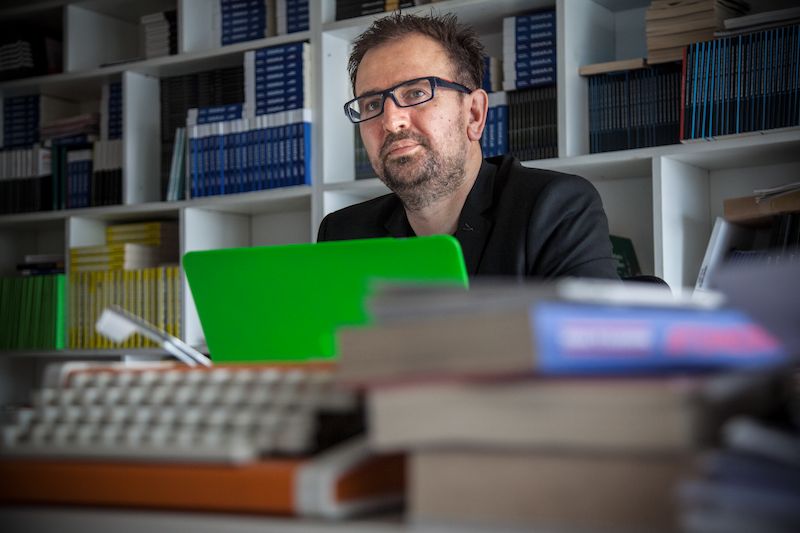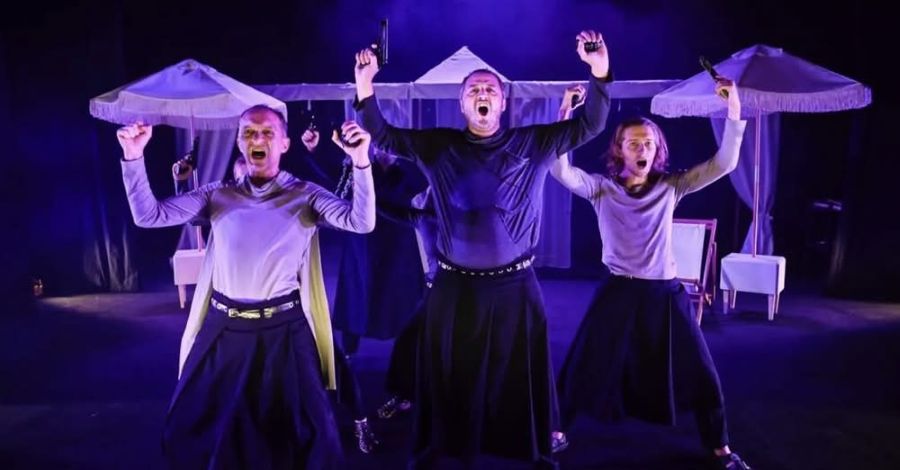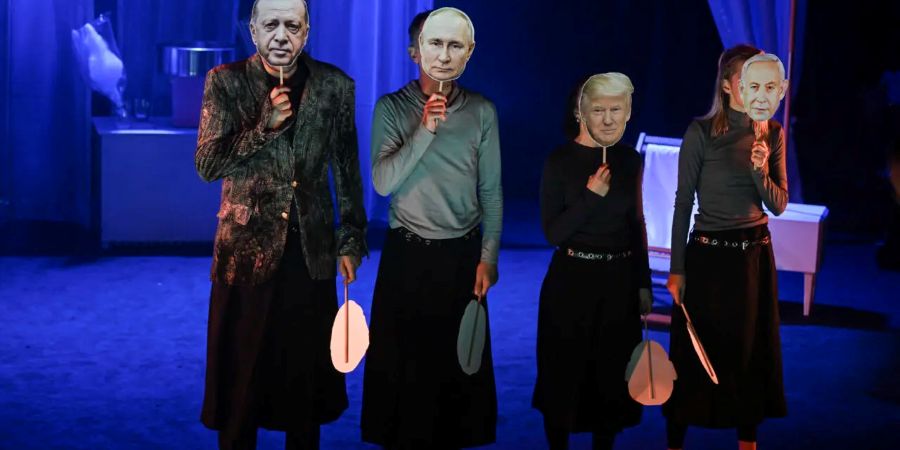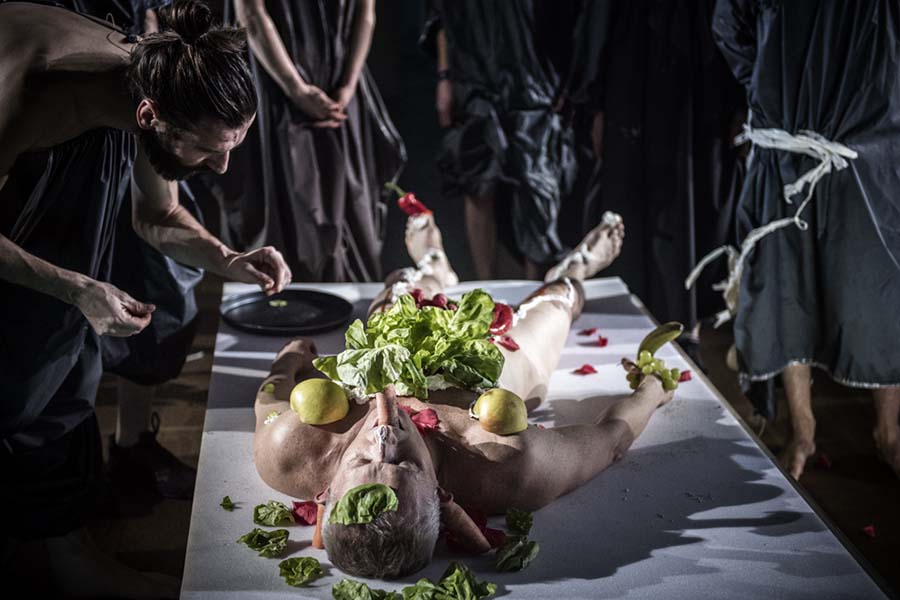If the past is any guide, the theatre can acquire a sense of immediacy and an elevated purpose in times of political crisis. One can find example after example of dissident theatre, often disguised as fables to avoid prosecution, in bars and coffeehouses from Brezhnev’s Soviet Union to communist Czechoslovakia to apartheid South Africa.
But the story of theatre in Kosovo, a nation established in 2008 in the wake of Yugoslavia’s collapse in the early 1990s, is a story that portends some striking similarities to what could happen to theatre in our ever-so-divided, even Balkanized United States.
For decades and with the blessing of the Soviet Union, Yugoslavia’s comparatively benign president, Yosip Broz Tito, held the fractured regions of Yugoslavia together by, for instance, granting administrative autonomy to the province of Kosovo. Kosovo was a secular province within Serbia containing around 90 percent ethnically Albanian Muslims, while Serbia was an Orthodox Christian republic of Yugoslavia. In 1980, Tito died, and so began the decade-long unraveling of the duct tape that had held Yugoslavia together. Serbia, under Slobodan Milošević, made multiple attempts to drive Albanian Muslims out of Kosovo, culminating in genocidal raids on Kosovar cities and villages.
These horrors finally ended when President Bill Clinton, with the counsel of Secretary of State Madeleine Albright, authorized NATO bombing runs on Serbian military targets in 1999. To this day, Albright is called “Nona” (mama or grandma) in Kosovo. Both she and Clinton have statues in the nation’s capital, Prishtina. A replica of the Statue of Liberty also towers over Prishtina.
(I should note that there is currently some anxiety in Kosovo regarding the new American administration, which is leaning toward being an apologist for Serbian and Russian aggression. After Kosovo’s prime minister Albin Kurti won reelection last month, he heralded Kosovo’s warm relations with the U.S. But Richard Grenell, special envoy for Serbia and Kosovo in the first Trump administration, tweeted that Kurti’s optimism was “delusional.”)
In the 1980s, post-Tito but before the end of Soviet-era Yugoslavia, it was an increasingly tribal, tension-filled place, not unlike the U.S. today, while the primary theatrical structure was a network of state and city theatres funded by the government. Jeton Neziraj—widely regarded as the national playwright of Kosovo, as well as being the executive director of Qendra Multimedia, an independent, Prishtina-based center for theatre and literature—said that in this interim period, state theatres put on work that was mainly lyrical and poetical, steeped in the classics. “They were a form of ‘high art,’” he explained, “maybe teasing out some social themes but aiming not to offend.”
That resonates with a lot of the work I see on U.S. stages now, which is often lyrical, perhaps teasing out themes of social relevance, perhaps not—but all scrupulously avoiding offense, especially in our larger regional houses.
The financial model and pressures on the former Yugoslav theatres were different from those in the U.S. in 2025, though the more general artistic impulses were strikingly similar. In Yugoslavia, theatre administrators were beholden to government bureaucrats who wanted to see full houses to justify government funds. It was always about the funding, and always will be.
Then came war, first as skirmishes, then as full-scale bombardments. Funding for city and state theatres disappeared, just as Yugoslavia itself did, in the war-ravaged regions of Bosnia-Herzegovina and Kosovo. In response, Neziraj recalled, a new generation of theatremakers created stages in bars and cafés in the 1990s. “In your face” theatre became their calling card, with nudity and cursing onstage reflecting social and political upheavals. Older generations of theatremakers and audiences were appalled, and left the theatre, never to return, according to Neziraj.
Attending his international theatre showcase in Tirana, Albania, in late 2024, I mentioned how pleased he must be to see his productions, staged in institutional venues, packed with young audiences, from teens to people mid-50s. Actually, he’s not entirely pleased. Though Kosovo is demographically a younger nation than the U.S., there are still plenty of older people. He’d love to see the “60-plus” generation back at the theatre, but older patrons won’t cross that threshold. Not anymore.

To be clear, the comparisons between Kosovo and the U.S. are hardly direct. The current prospects of actual civil war and genocide in the U.S. are slim, despite the specter of more raids on workplaces, internment camps, and mass deportations. Nor does the utter collapse of our nation along the lines of the splintering of Yugoslavia in the 1990s into multiple, independent nations seem likely. What does appear imminent in the U.S. is chaos borne of policies spun from loyalty, vengeance, and impulsiveness. The U.S. may well be entering its era of Jacobean revenge melodrama, with disruption to foundational institutions, from education to the justice system, from healthcare to international alliances, not to mention environmental protection. The nation may not collapse, but for many it may feel like it.
Such disruption, internal and global, would have an obvious and immediate impact on the arts and culture in general, and on our theatre institutions in particular. Tit-for-tat tariffs would drive up the cost of imported lumber (from Canada) and fabrics (from China) used in set and costume construction. If grocery and gasoline prices were to spike from trade wars, discretionary income would be whittled down, landing another gut punch to our theatres’ box offices.
Though Project 2025, of which most of the new president’s proposed cabinet are devotees, makes no specific reference to the National Endowment for the Arts (NEA), the Heritage Foundation think tank that created Project 2025 has a report on its website, citing 10 reasons why the NEA should be eliminated. During his 2016-2020 administration, President Trump made repeated attempts to gut NEA funding from his budgets but was blocked by bipartisan pushback in Congress. That kind of resistance is far more precarious in 2025—and recent updates to the NEA’s Grant for Arts guidelines suggest both retrenchment and regression.
Over the past five years, institutional theatres across the U.S. have been experiencing painful contraction: closing, decreasing, or suspending programming, losing spaces, and/or imposing severe staff cutbacks. For the past two years, a consortium of American artistic leaders (organized by the Professional Non-Profit Theater Coalition) has been lobbying Congress for legislation to prop up besieged theatres. Last year, I asked Public Theater artistic director Oskar Eustis, who has been part of that lobbying effort, what he imagined would happen to this effort should Trump return to power. I was met with a stone-faced response.
If worse leads to worst, can we count on a young generation to respond by creating stages in cafés and bars? Or will social media continue to be their window to the world?
This may be a false dichotomy, given the boom in stand-up comedy nationally, in which young audiences show up in droves to watch live performers ridicule social mores. According to Bloomberg, stand-up has tripled in size over the past decade, a trend largely due to a partnership between comedy clubs and streaming services such as Netflix and startup television networks such as Dropout TV.

In November 2024, Qendra Multimedia premiered Neziraj’s play Six Against Turkey, a docu-satirical portrait of events leading up to an attempted 2016 coup against the regime of Turkish president Recep Tayyip Erdoğan. It’s one in a series of Neziraj’s plays about the rise in authoritarianism across Europe. The satire was muted, though, compared with some Neziraj’s earlier plays, such as The Handke Project, a cartoon missile lobbed at Peter Handke, the Nobel Prize-winning playwright/novelist, genocide denier, friend of and apologist for Milošević, which was directed last fall by the playwright’s wife, Blerta Neziraj, who stages many of his premieres. In the wake of a recent performance of The Handke Project, Qendra Multimedia received a “cease and desist” letter from Handke’s estate, though in Europe, as in the United States, satire is a protected form of speech (for now, at least).
Both of these plays came in the wake of a still earlier political comedy, One Flew Over the Kosovo Theatre, which took aim at Neziraj’s own government of Kosovo, questioning its practice of stirring up patriotism while harboring its own corruptions. One can make many arguments about the body of Neziraj’s plays, but nobody can say that he retreats from the risk of creating offense, at home and abroad. It’s those offenses that make his work so pertinent.
Neziraj learned that during the rehearsals of Six Against Turkey, the Turkish Embassy was attempting to persuade the Kosovo government to prevent the play from opening in Prishtina. An editorial appeared in a newspaper supported by the Turkish government, Yeni Akit Gazeti, praising the friendship between Turkey and Kosovo, and claiming that Neziraj’s play was an affront to that friendship. Strangers appeared at rehearsals; when asked what they were doing there, they replied they were “interested in watching,” during which they took secret cellphone recordings of the rehearsals and posted them online. Two Turkish actors left the production for fear of reprisals upon their return to Turkey. On opening night, the theatre was swarming with secret service agents—so many that Neziraj couldn’t tell whether they were from Turkey or Kosovo.
But the play went on. Sort of. A later performance in the Kosovar city of Prizren was abruptly and uncharacteristically cancelled for unspecified “technical issues.” Still, at an awards ceremony, Kosovo’s Minister of Culture, Hajrulla Çeku, made a public statement praising Qendra Multimedia’s political bravery. “As institutions and as a society, we have an obligation to make sure that creative freedom and artistic creativity develop without hindrance,” he said. “When it is hindered, we are there to offer our support.”
This is an echo of 1970, when L.A.’s flagship theatre, the Mark Taper Forum, was just three years old. That’s when a production of The Trial of the Catonsville Nine, about Christian activists who’d stolen and burned files from a Maryland draft office to protest the Vietnam War, written by their leader, Father Daniel Berrigan, was swarming with FBI agents, who took fastidious notes throughout, according to the Taper’s founding artistic director, Gordon Davidson.
Davidson had some experience offending his audience: He opened the Taper with John Whiting’s 1961 play The Devils, an attack on a libertine priest, which sent two thirds of its opening night audience—including then-Gov. Ronald Reagan, his wife Nancy, and a swath of Hollywood luminaries—heading for the exits. Still, the leading lights of that board of directors, movie mogul Lew Wasserman and philanthropist Dorothy Chandler, were steadfast in their support of Davidson, and his view that among its many purposes (including entertainment and education) theatre’s purpose is also to provoke, even at the risk of offense.
What has happened in the 60 years since The Devils upset audiences at Washington, D.C.’s Arena Stage, and later at the Taper? Have the American institutional theatres ushered in by the likes of Davidson and the Arena’s Zelda Fichandler come to resemble the timid state theatres of the former Yugoslavia? Are we, too, a fractured republic held together by duct tape? Is that what our theatres are telling us?
Maybe not. In Southern California, the January infernos were like bombs dropping on a community, leading to some carping as well as myriad kindnesses and generosities that bordered on the theological. We are not all that we seem on social media. Much of the vitriol we see there is born of resentments that can be tempered and even healed by the empathy and love generated in communities and expressed in our theatre. That’s what I saw firsthand in Los Angeles 2025, when our theatres took on the role of churches when they finally reopened after the fires.
If funding dries up, as it did in Kosovo, will our young people, at long last, in an era that portends upheaval, use cafes and bars and stand-up clubs to wake us up to the folly and glory of who we are? And will the way they do that cost us as an entire generation of older theatre patrons, as it did in Kosovo?
And is it conceivable that one day, when the skies have cleared, that our arts budget will triple in four years, as they have in Kosovo?
Steven Leigh Morris is the founding editor of the L.A.-based theatre discussion website stageraw.com. His play White People was presented in Kosovo and Albania in 2024 by Qendra Multimedia. He is currently writing a biography of Gordon Davidson.
Support American Theatre: a just and thriving theatre ecology begins with information for all. Please join us in this mission by joining TCG, which entitles you to copies of our quarterly print magazine and helps support a long legacy of quality nonprofit arts journalism.




